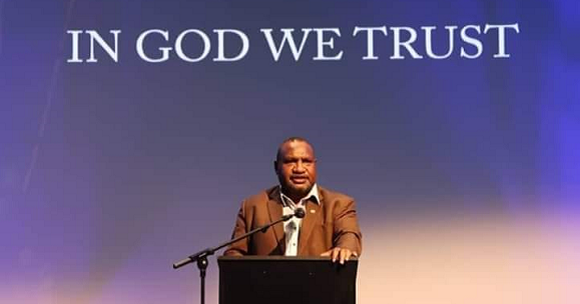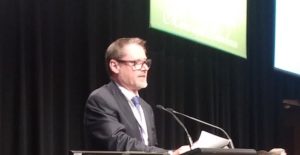Prime Minister James Marape has introduced changes to Papua New Guinea’s Oil and Gas Act, claiming it will benefit the country’s ‘national interest’. The changes may well represent a major shift in the way hydrocarbon projects are developed in the future.

Prime Minister James Marape. Credit: James Marape/Facebook
Tabling significant changes to the country’s oil and gas legislation in Parliament last week, Papua New Guinea’s Prime Minister James Marape said PNG’s oil and gas laws have been ‘crafted and applied to entice foreign capital and know-how’. As a consequence, he stated, the ‘National Interest’ has been subordinated to ‘Commercial Interest’ at great cost to the people of PNG.
‘Attracting foreign investors and capital is important, but this cannot remain unchecked forever,’ Marape said. He added that foreign investors are ‘not here to support our “National Interest” agenda unless it suits them or they are compelled by law or politics to do so. They are motivated by profit, not nation building.’
‘We need to dispel the myth that industry doesn’t put a lot of money into PNG government coffers.’
The new Oil and Gas (Amendment) Bill 2020, which seeks to amend PNG’s existing Oil and Gas Act 1998, appears to be an important change of direction. Marape said there must be a greater ‘share of revenue’ going to the government, arguing that PNG gets a lower level than comparable producing countries around the world.
‘This necessarily means taking control of exploration activities through to development. Unless positive changes are made without destroying the industry, PNG’s total share of project revenue will continue being lower than most Producing Countries.’
Returns and cash flow
Defining what is meant by ‘project revenue’ is key.
John Chambers, General Manager of Santos, said in an online conference last week that there tends to be a confusion between ‘cash flow’ (the amount of money that flows through the company, which is typically similar to revenue or sales) and the Internal Rate of Return (IRR) – the profitability of a project over its lifetime.
‘Cash flow is a distraction, because people think that is what you are splitting. In fact, what you split is profit, not cash flow.’
Tax revenue
While the Prime Minister is arguing PNG should get more for its oil and gas projects, Chambers claims the amount of tax revenue that the resources sector provides is often underestimated. He also believes in this decade it will also rise significantly as the ExxonMobil-led PNG LNG project moves into a more mature phase.
‘In resource-rich countries … there is also a “multiplier effect”, whereby a resource projects stimulates three times the projects size in additional economic activity.’
‘What they don’t realise is quite how important the PNG resource industry is. We need to dispel the myth that industry doesn’t put a lot of money into PNG government coffers.’
In 2017, according to Chambers, the direct government take from the resources industry accounted for about 20 per cent of government revenue: K2.437 billion out of a total of K12.098 billion total tax revenue. This was made up of:
- Corporate income tax (K116 million)
- ITC projects (K372 million)
- Salary and wage tax (K597 million)
- Royalties and levies (K298 million)
- Dividends (K281 million)
- Kumul Petroleum Holding’s share of PNG LNG cash flows (K759 million)
- Other (K14 million)
Chambers said the resources industry percentage of government revenue will increase to 25 per cent of the total between the years 2020 and 2024 and 32 per cent of the total from 2026 to 2029 – largely due to an increase in corporate tax payments on PNG LNG.
‘Just the primary government take will rise to about 30 per cent and there will be a multiplier on that,’ Chambers said. ‘The sector will be of growing importance.’
Changes
The main potential point of difference, he said, is companies’ desire to maximise their return on investment and the government’s desire to strengthen the economy of the nation.
Marape seems to agree. He says PNG’s national interest agenda was not being protected properly by some sections of the legislation, pointing to sections 54, 56, 57, 183, 184 and 185 in particular.
‘What is concerning is that those sections are more supportive and protective of the “commercial interests” of foreign investors,’ said Marape, noting that sections 183, 184 and 185 ‘place the State at a disadvantage when negotiating the Agreements.’
Assuming the proposed legislation is gazetted, a greater role for Kumul Petroleum Holdings, the State’s nominee for oil and gas projects, in developing future projects should be expected.









Speak Your Mind